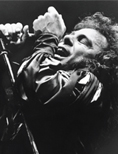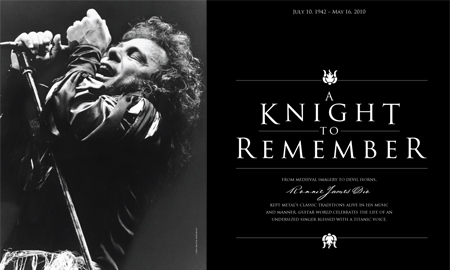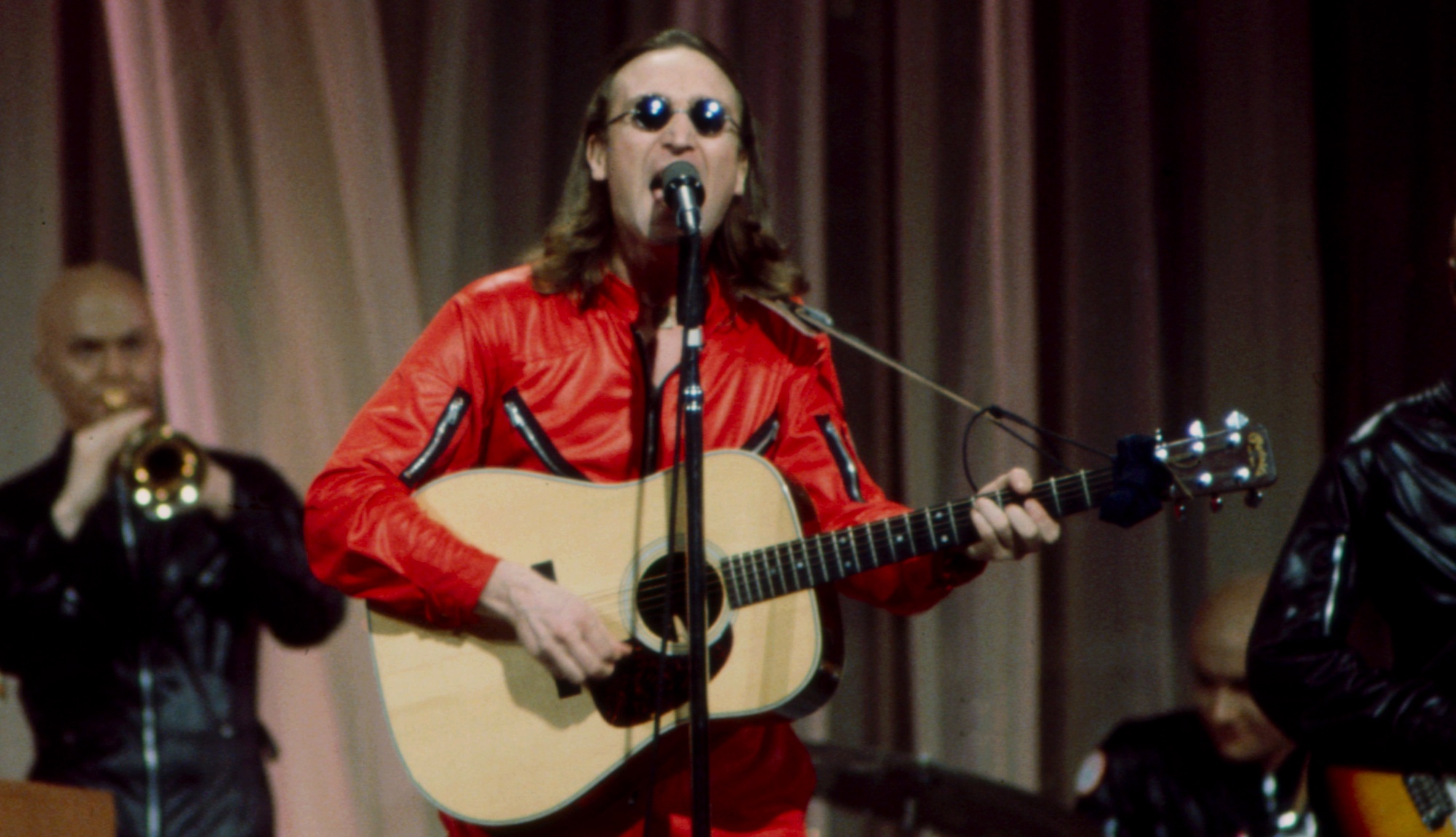Ronnie James Dio: the undersized singer blessed with a titanic voice
From medieval imagery to devil horns, the Rainbow and Black Sabbath singer kept metal’s classic traditions alive in his music and manner. Guitar World celebrates the life of an undersized singer blessed with a titanic voice
All the latest guitar news, interviews, lessons, reviews, deals and more, direct to your inbox!
You are now subscribed
Your newsletter sign-up was successful


Originally published in Guitar World, August 2010
From medieval imagery to devil horns, Ronnie James Dio kept metal’s classic traditions alive in his music and manner. Guitar World celebrates the life of an undersized singer blessed with a titanic voice.
Depending on when you came of age as a metal fan, your first introduction to Ronnie James Dio could have occurred at any number of musical avenues. Perhaps you first heard him in the mid Seventies as the voice of Rainbow, belting out rockers like “Man on the Silver Mountain” and “Long Live Rock ’n’ Roll” alongside guitar legend Ritchie Blackmore. Or maybe it was in the early Eighties when he was the singer for Black Sabbath, a band rejuvenated in no small part due to Dio joining its ranks prior to the making of its classic Heaven and Hell album. Possibly you came across him later in the decade, when he was fronting his own eponymously named group on such medieval-metal masterpieces as Holy Diver and The Last in Line.
For those who were turned on to metal in the Nineties or later, Dio was regarded as an elder statesman of the genre, a keeper of the flame of traditional metal mores (he was commonly credited with having popularized, if not invented, the now ubiquitous devil horns hand sign). Even more recently, he was celebrated as the man at the helm of one of music’s biggest reunions, joining with his old Sabbath mates for an album and tour as Heaven & Hell.
Which is all to say that, if you have been a fan of heavy metal for any length of time over the past four decades, you have probably been a fan of Ronnie James Dio at one point or another. With Dio’s passing on May 16, 2010, at the age of 67, after a bout with stomach cancer, the metal world lost one of its longest-running practitioners and proponents, as well as one of its greatest singers and performers. Though Dio was not a guitar player, throughout his career he worked alongside some of rock’s finest, including Blackmore and Tony Iommi, and helped to bring new six-string talent—in particular a young Vivian Campbell—to the metal public’s ears. He was also a capable bass player and gifted songwriter. “Ronnie opened me up to a whole new way of writing,” Iommi told Guitar World in 2007. “And what resulted was all these different types of songs that sounded nothing like what Sabbath had done in the past.”
The news of Dio’s death reached the public via his longtime wife and manager, Wendy, in the form of a short message posted to his official website on the morning of the 16th. And while the outpouring of emotion from fans was to be expected, what was perhaps more illustrative of Dio’s musical impact was the sheer number of rock heavyweights who felt compelled to pay tribute to the singer. Iommi called Dio “the man with the magic voice,” and said it had been “an honor to play at his side for all these years.” Slayer’s Kerry King stated that “few people have had the ability to carry a song like Dio,” and Metallica’s Lars Ulrich talked of being “inspired and influenced” by his music. Artists ranging from Alice Cooper to Pearl Jam inserted bits of Dio’s music into their live sets in the days following his passing, and dozens of musicians old and new publicly attested to his immense talent and kind character. But it was an unlikely admirer, Queen guitarist Brian May, who perhaps put it best: “In my opinion, Ronnie was one of the creators of the genre of heavy metal,” May said in a statement. “He was universally loved in the community of rock music, and will be sorely missed.”
Dio was born Ronald James Padavona on July 10, 1942, in Portsmouth, New Hampshire, and grew up in Cortland, a small town in upstate New York. He adopted the surname by which he would become famous in the early Sixties, inspired by Italian-American gangster Johnny Dio. By this time, his music career was already in full swing. As far back as the late Fifties, Dio had begun playing bass with a local doo-wop-style pop group, the Vegas Kings. Within a few years they had rechristened themselves Ronnie and the Redcaps, and later Ronnie Dio and the Prophets, with Dio at the helm as lead singer.
All the latest guitar news, interviews, lessons, reviews, deals and more, direct to your inbox!
The Prophets disbanded in the late Sixties, and it was with his next band, the Electric Elves—later known as Elf—that Dio began his ascent to heavy metal stardom. Though Elf’s blues-rock sound never earned them a substantial following, they had fans in high places, in particular, Deep Purple bassist Roger Glover, who with Purple drummer Ian Paice co-produced Elf’s 1972 self-titled debut. Additionally, the band was signed to Purple Records and supported Deep Purple on several tours. It was during that time that Dio’s powerful voice came to the attention of Ritchie Blackmore. When the guitarist split from Purple in 1975, he wasted no time recruiting Dio and his Elf bandmates—minus their axman—for his next project, Rainbow.
Blackmore and Dio proved to be ideal bedfellows. The guitarist, who had quit Deep Purple in objection to the band’s increased funk and soul proclivities, envisioned Rainbow as a heavier rock outfit with classical leanings. The combination of Blackmore’s heavy and majestic playing and Dio’s quasi-operatic vocals and medieval-themed lyrics resulted in a trio of classic Seventies metal albums: 1975’s Ritchie Blackmore’s Rainbow, the following year’s Rising and 1978’s Long Live Rock ’n’ Roll. While Rainbow were generally regarded as a vehicle for Blackmore’s virtuoso playing, Dio’s throaty vocals and vivid lyrical imagery were as much defining traits of the band’s music as were the guitar riffs.
Dio cut a striking figure onstage as well. His theatrical, exaggerated performance style, coupled with his appearance—he stood just five-feet-four and had wild and wiry locks sprouting from his head, giving him a gnomish, fantastical look—helped to transform him into a larger-than-life icon to a new generation of metal fans. His fervent devotion to a style that some in the press took to labeling “castle rock” eventually led to his being fired by Blackmore when the guitarist opted to take Rainbow in a more pop-rock direction.
Dio, for his part, merely left behind one British guitar icon for another equally renowned: Tony Iommi. In 1979, the singer replaced Ozzy Osbourne as the frontman in Black Sabbath. Though the band’s fortunes had been in decline for several years, Sabbath found new life with Dio. On their first album together, 1980’s Heaven and Hell, the band adopted a heavier, more modern sound befitting the new decade, best evidenced on the charging leadoff track, “Neon Knights.” This development was in no small part due to Dio’s presence, as he and Iommi were the primary songwriters for the majority of the album. “We hadn’t really done too much uptempo stuff with Ozzy,” Iommi told Guitar World. “But it was something that appealed to Ronnie, and also something he was very good at. A song like ‘Neon Knights’ could have only come together at that time.”
The following year’s Mob Rules was another strong outing, but Dio and Iommi’s relationship soon soured. During the mixing of 1982’s concert document, Live Evil, Iommi and Sabbath bassist Geezer Butler accused Dio and drummer Vinny Appice of sneaking into the recording studio to raise their respective vocal and drum parts on the tracks. “That was a real kick in the nuts,” Dio told Guitar World in 2007. “That’s the last thing I would ever do, but [Iommi and Butler] believed people who were lying to them. So the writing was on the wall. There was no need to try to continue on.”
Dio, along with Appice, was fired from the band, and though both would return to Black Sabbath for 1992’s Dehumanizer, the singer spent the majority of the next two decades building his own brand. With his solo band, simply named Dio, he fully indulged his taste for sword-and-sorcery-style metal. Dio became known for over-the-top live shows and bombastic conceptual music videos, such as the clip for 1983’s “Holy Diver,” which presents the diminutive frontman, outfitted in animal pelts and wielding a sword practically the size of his body, roaming an ancient cathedral and slaying all sorts of nefarious characters. “I enjoy writing about medieval themes because you can take incredible liberties and let your imagination run wild,” Dio told Guitar World in 2002. “I don’t write love songs.”
If Dio exhibited a certain dramatic grandness in his music and visuals, he also demonstrated a knack for consistently bringing dazzling guitarists into his fold. His first guitar recruit when forming his solo band in 1982 was Jake E. Lee, at the time a largely unknown player with Rough Cutt, who later rocketed to fame with Ozzy Osbourne. They worked together for only a short time before the relationship fizzled. Lee claimed that Dio asked him to simplify his guitar parts so as not to compete with his vocals. Whether or not it’s true, Dio’s next discovery, a young Irish guitarist named Vivian Campbell, was given plenty of space in which to shine. “Viv was absolutely perfect,” Dio told Guitar World. “He took chances and played with incredible speed.”
Campbell’s fret-burning work on Dio’s 1983 debut, Holy Diver, contributed in large part to the enduring appeal of tracks like “Rainbow in the Dark,” “Stand Up and Shout” and the title song. He remained with the band for two more albums, 1984’s The Last in Line and 1985’s Sacred Heart, before departing, like others before him, under acrimonious circumstances. In a 2009 interview with Guitar World, Campbell chalked up their differences partly to age. During his tenure with the band, Dio, then in his forties, had twice as many years on the young guitarist. “We were from different generations, different cultures,” Campbell said. “I just didn’t have anything in common with him.”
Despite having butted heads with many of his guitarists, Dio was a much beloved figure and regarded as one of the warmest and most genuine in metal, as scores of peers and fans have attested in the weeks since his passing. Geezer Butler said in a statement, “I can truly say I’ve never known anyone to have such loyal, loving friends, fans, and family as Ronnie. He really was a special person, blessed with a unique voice and presence.” If anything, Dio’s disagreements with bandmates, in particular during his solo years, was often credited to his reputation as a taskmaster, a charge to which Dio partly admitted in a 2003 interview with Rhino.com: “I’m a rather impatient person,” he said of his musical process. “I kind of see through things right away and say, ‘Why don’t we do it this way?’ ”
Regardless, the fact remains that throughout his years fronting Dio, the singer offered a shining spotlight to numerous talented guitarists, including Campbell, Craig Goldy, Rowan Robertson, Tracy G and current Whitesnake member Doug Aldrich, who in 2002 spoke with Guitar World about his experiences recording that year’s Killing the Dragon album. “One of the things that shocked me right away about Ronnie was how into the music he is,” Aldrich said. “While we were recording he would notice everything, every note I played.” Perhaps this, in fact, was what Vivian Campbell had meant when he told Guitar World that playing with Dio “was like being in a band with your dad.”
For the rest of us, Dio was not so much a father figure as a godhead type. His recent reunion with Iommi and Butler in Heaven & Hell underscored not only the mutual love and respect that existed between the one-time Sabbath bandmates and, for a moment, adversaries, but also the singer’s status as a metal legend. And if at times over the years Dio had come to be regarded as a symbol of all that was goofy and dated about the music, it was at the same time his sincerity, his devotion to his craft and his steadiness in the face of the many changing tides and trends in metal that made him an icon to millions of fans.
Which is not to say that he was above poking fun at himself: In 2001, comedy duo Tenacious D’s self-titled album included a song called “Dio,” in which Jack Black admonished the singer for being “too old to rock.” Dio, at that point having “rocked” for close to half a century, acknowledged the good-natured ribbing by casting Black and Tenacious D bandmate Kyle Gass in his video for Killing the Dragon’s “Push,” as well as appearing in Tenacious D’s 2006 movie, The Pick of Destiny, as a somewhat divine version of himself. In a statement released after his death, Jack Black, an avowed fan, said of Dio, “he was as cool a person as you could hope to meet. He was generous and softspoken, humble and serene, and had a tremendous sense of humor.”
Black also made note—and here he perhaps could have been speaking for metal fans the world over—of what he described as the “life-affirming fire” of Dio’s songs. “They were filled with glory,” he said. “They made me want to climb mountains and battle demons.
Rich is the co-author of the best-selling Nöthin' But a Good Time: The Uncensored History of the '80s Hard Rock Explosion. He is also a recording and performing musician, and a former editor of Guitar World magazine and executive editor of Guitar Aficionado magazine. He has authored several additional books, among them Kurt Cobain: Montage of Heck, the companion to the documentary of the same name.

